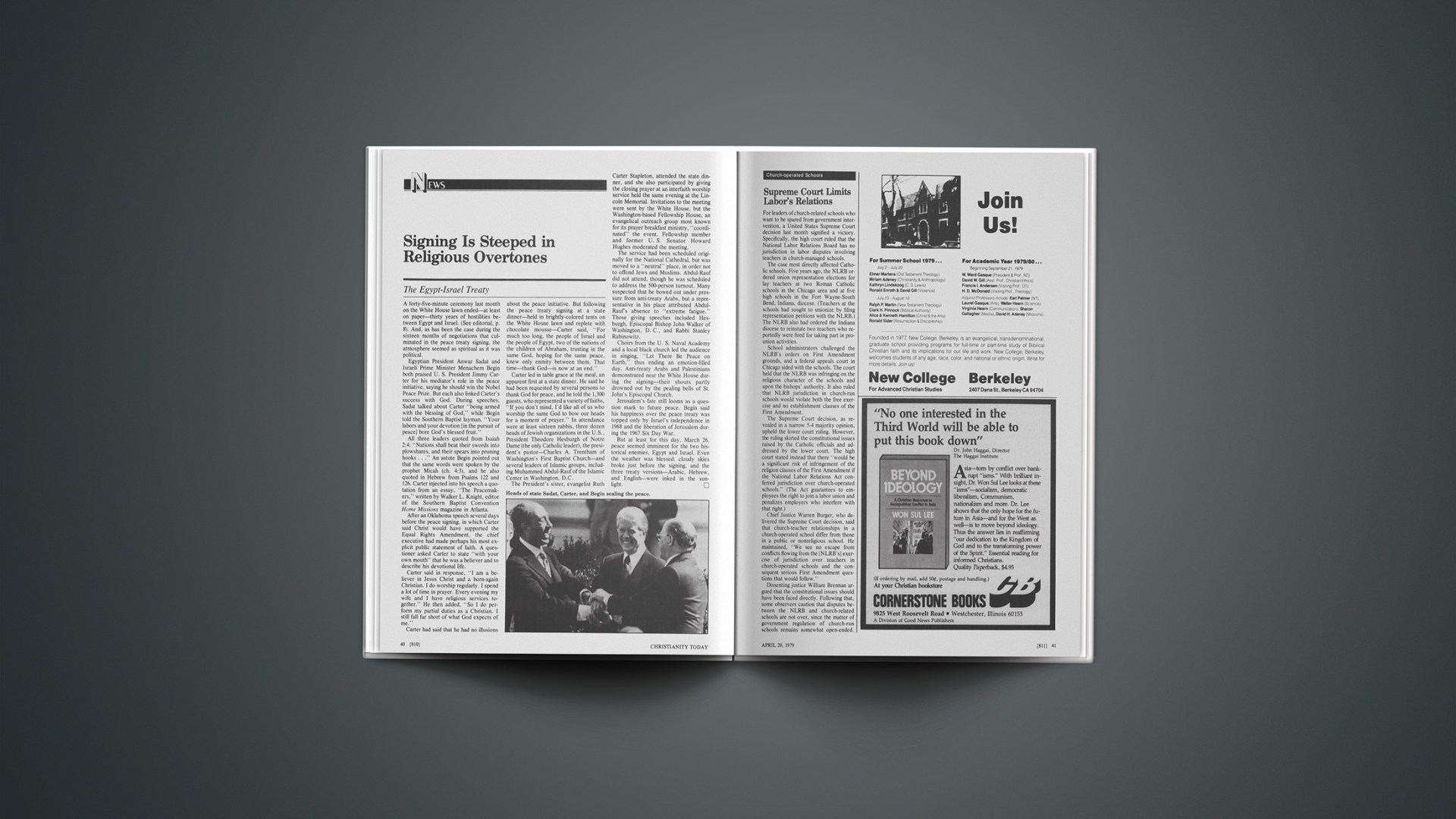The Egypt-Israel Treaty
A forty-five-minute ceremony last month on the White House lawn ended—at least on paper—thirty years of hostilities between Egypt and Israel. (See editorial, p. 8). And, as has been the case during the sixteen months of negotiations that culminated in the peace treaty signing, the atmosphere seemed as spiritual as it was political.
Egyptian President Anwar Sadat and Israeli Prime Minister Menachem Begin both praised U. S. President Jimmy Carter for his mediator’s role in the peace initiative, saying he should win the Nobel Peace Prize. But each also linked Carter’s success with God. During speeches, Sadat talked about Carter “being armed with the blessing of God,” while Begin told the Southern Baptist layman, “Your labors and your devotion [in the pursuit of peace] bore God’s blessed fruit.”
All three leaders quoted from Isaiah 2:4: “Nations shall beat their swords into plowshares, and their spears into pruning hooks …” An astute Begin pointed out that the same words were spoken by the prophet Micah (ch. 4:3), and he also quoted in Hebrew from Psalms 122 and 126. Carter injected into his speech a quotation from an essay, “The Peacemakers,” written by Walker L. Knight, editor of the Southern Baptist Convention Home Missions magazine in Atlanta.
After an Oklahoma speech several days before the peace signing, in which Carter said Christ would have supported the Equal Rights Amendment, the chief executive had made perhaps his most explicit public statement of faith. A questioner asked Carter to state “with your own mouth” that he was a believer and to describe his devotional life.
Carter said in response, “I am a believer in Jesus Christ and a born-again Christian. I do worship regularly. I spend a lot of time in prayer. Every evening my wife and I have religious services together.” He then added, “So I do perform my partial duties as a Christian. I still fall far short of what God expects of me.”
Carter had said that he had no illusions about the peace initiative. But following the peace treaty signing at a state dinner—held in brightly-colored tents on the White House lawn and replete with chocolate mousse—Carter said, “For much too long, the people of Israel and the people of Egypt, two of the nations of the children of Abraham, trusting in the same God, hoping for the same peace, knew only enmity between them. That time—thank God—is now at an end.”
Carter led in table grace at the meal, an apparent first at a state dinner. He said he had been requested by several persons to thank God for peace, and he told the 1,300 guests, who represented a variety of faiths, “If you don’t mind, I’d like all of us who worship the same God to bow our heads for a moment of prayer.” In attendance were at least sixteen rabbis, three dozen heads of Jewish organizations in the U.S., President Theodore Hesburgh of Notre Dame (the only Catholic leader), the president’s pastor—Charles A. Trentham of Washington’s First Baptist Church—and several leaders of Islamic groups, including Muhammed Abdul-Rauf of the Islamic Center in Washington, D.C.
The President’s sister, evangelist Ruth Carter Stapleton, attended the state dinner, and she also participated by giving the closing prayer at an interfaith worship service held the same evening at the Lincoln Memorial. Invitations to the meeting were sent by the White House, but the Washington-based Fellowship House, an evangelical outreach group most known for its prayer breakfast ministry, “coordinated” the event. Fellowship member and former U. S. Senator Howard Hughes moderated the meeting.
The service had been scheduled originally for the National Cathedral, but was moved to a “neutral” place, in order not to offend Jews and Muslims. Abdul-Rauf did not attend, though he was scheduled to address the 500-person turnout. Many suspected that he bowed out under pressure from anti-treaty Arabs, but a representative in his place attributed Abdul-Rauf’s absence to “extreme fatigue.” Those giving speeches included Hesburgh, Episcopal Bishop John Walker of Washington, D. C., and Rabbi Stanley Rabinowitz.
Choirs from the U. S. Naval Academy and a local black church led the audience in singing, “Let There Be Peace on Earth,” thus ending an emotion-filled day. Anti-treaty Arabs and Palestinians demonstrated near the White House during the signing—their shouts partly drowned out by the pealing bells of St. John’s Episcopal Church.
Jerusalem’s fate still looms as a question mark to future peace. Begin said his happiness over the peace treaty was topped only by Israel’s independence in 1968 and the liberation of Jerusalem during the 1967 Six Day War.
But at least for this day, March 26, peace seemed imminent for the two historical enemies, Egypt and Israel. Even the weather was blessed: cloudy skies broke just before the signing, and the three treaty versions—Arabic, Hebrew, and English—were inked in the sunlight.










